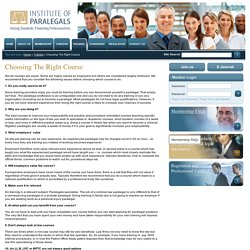

Paralegal job profile. A career as a paralegal may suit you if you thrive under pressure, have good analytical and communications skills and a strong interest in the law Paralegals provide support to solicitors and barristers in a variety of law firms, chambers and in private, public sector and not-for-profit organisations.

They play an important role within a legal team and their tasks often mirror the work of a trainee - or at times even a recently qualified solicitor. Job titles can vary depending on the organisation and legal practice area and you may see roles advertised seeking clerks, legal executives, legal assistants or caseworkers. Depending on the role, paralegals can be involved with a range of tasks and activities; some are specialists in their field while others carry out non-legal tasks or have less status. Types of paralegal work Areas of specialisation include: Responsibilities As a paralegal, you'll need to: Salary Income figures are intended as a guide only. Working hours What to expect Skills. Paralegal Job Information. Page Content Paralegal Hours37-40+ per weekStarting salary£12,000 + per year Paralegals specialise in one area of the law, carrying out a range of legal work.

Leeds University Library /S@L. What is a Paralegal? > National Association of Licensed Paralegals. A Paralegal is a person qualified through education and training to perform substantive legal work that requires knowledge of the law and procedures and who is not a qualified solicitor or barrister.

Paralegals may work for, or be retained by solicitors within the legal profession or they may work within a legal environment within commerce, industry or the public sector. Paralegals are important members of the legal team Within the legal profession, solicitors have always relied upon their unadmitted support staff and could not operate effectively without them. Paralegals are important members of the legal team, playing key roles in the legal process. Their duties involve them working closely with Solicitors and Barristers and may take them from office to courtroom, from clients to conferences, from the law library to the negotiating table. The work that Paralegals undertake is quite often virtually indistinguishable from that undertaken by the Solicitors who employ them. Paralegal job description.
Rachel Smith is a conveyancing paralegal in Glasgow.

A paralegal is a non-lawyer (ie not a solicitor, barrister or legal executive) undertaking legal work, usually in a specialist area. They may work within the legal profession or in the commercial world. What does your job as a paralegal involve? I act on behalf of clients who wish to purchase and sell property. This involves working directly with clients, both in person and over the telephone. What is involved when people are buying and selling property? The work involved in dealing with purchase is different to the work for property sales. For sales, a client will contact me when they are putting their property on the market. Do you have a typical day? Some days, I am busy meeting clients to go through the stages of transactions. Work-as-a-paralegal. Institute of Paralegals - The Job Market.
The New Paralegal Profession It used to be that when people talked about working in the law they really meant getting a job in a solicitors' firm, and the only legal jobs which led to a genuine careers were that of solicitor or barrister (i.e becoming a lawyer).

Everything has changed, and that change is set to continue over the next few years: There are now eight groups of recognised, regulated lawyer: solicitors, barristers, notaries, patent agents, trade mark agents, licensed conveyancers, legal executives and law costs draftsmen. Within solicitors' firms there are now an increasing number of career options (paralegal, HR director, training manager etc.). Beyond solicitors' firms there are now numerous legal jobs: in charities; local authorities; central government departments and agencies; the court system and in industry and commerce. The Numbers Within solicitors' firms there are already circa 60,000 paralegals (about 44% of all fee-earners!) Geography Deregulation The Future 1. 2. 3. 4. Junior lawyers division. Paralegal Training,Courses,Information: BAP. Institute of Paralegals - Choosing The Right Course. Not all courses are equal.

Some are highly valued by employers but others are considered largely irrelevant. We recommend that you consider the following issues before choosing which course to do: 1. Do you really need to do it? Some training providers imply you must do training before you can become/call yourself a paralegal. 2. The best courses to improve your employability are practice and procedure orientated courses teaching specific useful information on the type of law you wish to specialise in. 3. On-the-job-training can be very expensive. Employers therefore most value relevant prior experience above all else. 3. If prospective employers have never heard of the course you have done, there is a risk that they will not value it regardless of how good it actually was. 6.
Do training in a relevant subject. 8. You do not have to wait until you have completed your course before you can start applying for paralegal positions. Institute of Paralegals - Home. Your gateway to success in Law > National Association of Licensed Paralegals.